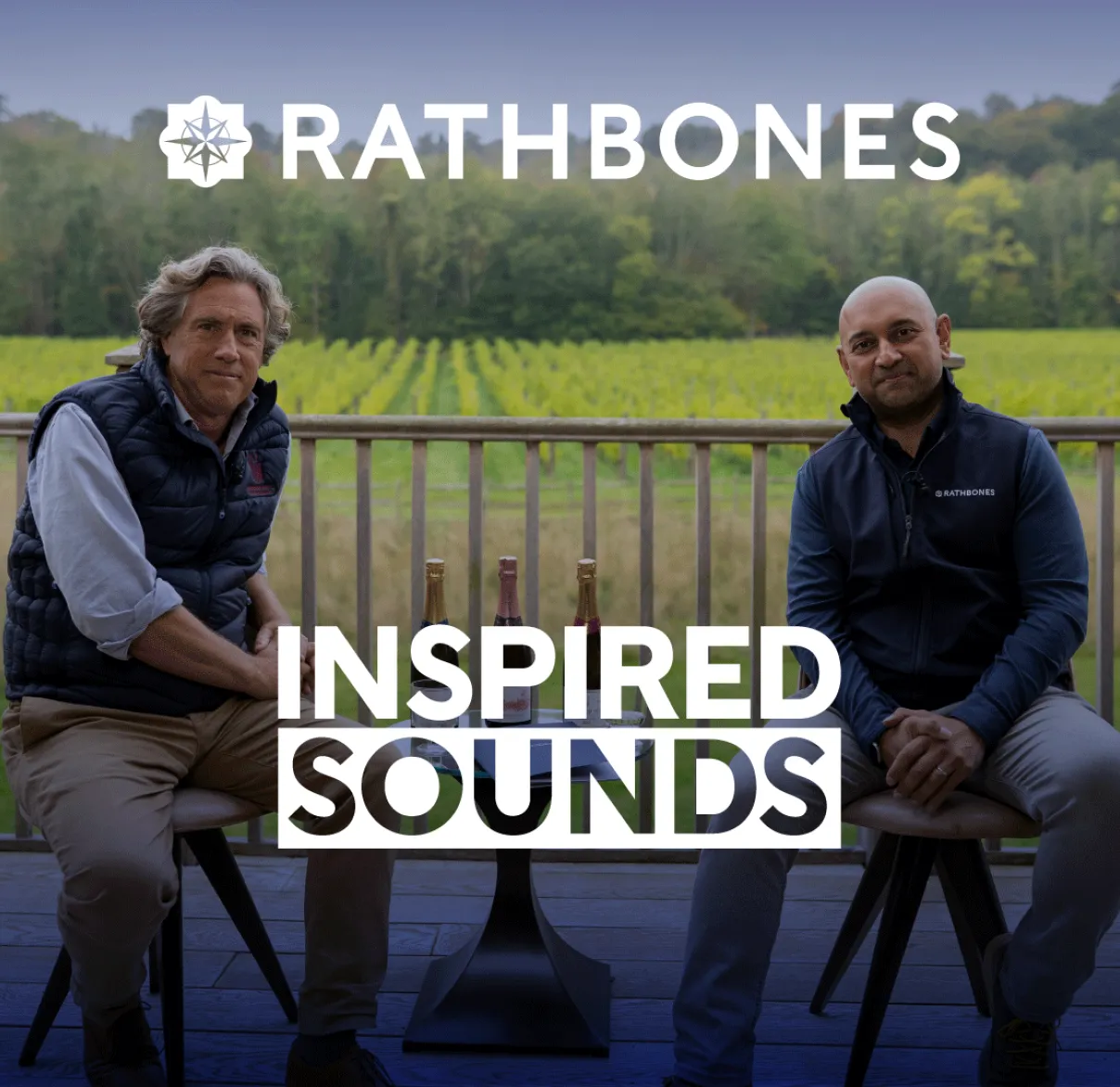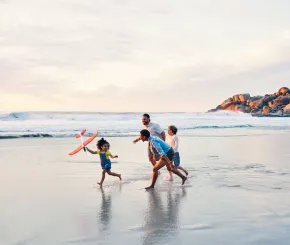Laura Tenison:
A lot of people presumed that we had stores first and then we went the other way around. But actually, when I first developed a website, it was before Mothercare, and Mothercare was the biggest mass market retailer in our niche market sector. It was literally a friend of mine who said to me, “You ought to have a website.” And I literally said, “What’s that?” You know, it was that early on. I just knew that I couldn’t really run a company any other way. So I actually thought, well, the truth is either I have to give up Jojo or Jojo will kill me. And so that’s kind of what happened. And it was really hard. After Jojo, I knew I was going to do something. I wasn’t quite sure what. I needed to learn to breathe again. I just found that when I came up to the farm and was designing new gardens — because I do all the design up here — I would come up here and I just learned to breathe.
Voiceover:
Hello and welcome to Inspired Sounds, Rathbones’ exclusive podcast dedicated to supporting and empowering entrepreneurs. In each episode, we dive into the journey of inspirational entrepreneurs and founders who we invite to share the thrills and spills of their own journey. We hope you enjoy listening.
Rebecca Tunstall:
I’m Rebecca Tunstall, one of the investment directors at Rathbones. I’m delighted to be joined today by Laura Tenison of Jojo Maman Bébé. Laura, welcome. Tell us a little bit about how you started the idea of this business, which has become so incredibly popular. Every single one of our listeners will have heard of it.
Laura Tenison:
Well, obviously Jojo was my last business, and actually it was my third business. So I suppose I am a serial entrepreneur, but I had a bit of a gap where I ran Jojo for 29 years. That was quite a long process staying with that company. Jojo started really from the wish to get back into fashion. I’d been making and selling clothes — initially for myself, then for friends and family, and then I started selling them to other people — really since my teenage years. I started, I think while I was still at school, probably about 16, a business making men’s clothes, which I did for a couple of years. But I found that it was very difficult to scale the business. It was very high-end, made to measure. So I decided to do something else and spent a couple of years travelling around the Middle East. I went to Damascus to look for silk, working with beautiful silk fabrics at the time, and then on to India. I spent six months in India and always had a purpose with my travelling. So whilst I was basically backpacking, I was also looking for factories and suppliers for my fashion company.
But I realised that actually menswear was problematic. So I decided to work for another company, a British manufacturer retailer, and learnt a little bit more about the retail side. After doing that for a bit, I thought I really need to get back into fashion. I wrote a business plan, went to about five high street banks — no one would give me any cash to start the business. So, frustrated, I decided to launch a service industry because you can start a service industry with very little cash. I became a builder in France. It’s a bit of a transition from one to the other, but for the next three years I built up a French property agency, finding houses for clients and renovating them with local tradesmen. I learnt so much about building, and ironically, once I’d done that and sold that business as a going concern, I wanted to come back into fashion. By then, I could manufacture clothes, I knew a lot about building work, and it meant that when I did come back into retail, I was able to do a lot of the property finding and building surveys when we were looking for stores.
Then I had a head-on collision car crash while selling my business in France. I was air-ambulanced back to the UK, spent a few weeks in hospital. While that could have been seen as a problem — and in fact, it’s left me with a pair of crutches in my front hall for when my knees flare up — it also taught me to go down the children’s wear route. I didn’t have children of my own, but my ward neighbour in St Thomas’s Hospital in Chelsea was a young mum, very seriously ill, and she would complain to me that she couldn’t find anything nice to dress her children in. That kind of sparked the idea for Jojo.
Having worked in France, I’d come to really love the outdoors. I hated the way that in the UK people would say, “Oh, we can’t go out today because it’s raining.” I thought that’s absolutely ridiculous — more fun to go to the park when it’s raining, go splash in puddles as a little kid. So, in a way, not having my own children gave me great freedom to design with no restrictions. Jojo really started as a tiny business with me making the first samples, going around trade fairs, finding factories. Some of my first factories were in really obscure places because I had very small quantities.
One of my first countries that I worked with closely was Colombia, because I found a group of Colombian fashion factory owners who wanted to start importing into the EU. In those days, the biggest export from Colombia was cocaine, and the EU had funded these factory owners to come and exhibit at the trade fair in Paris. No one was giving them any orders, and I pitched up and said, “These are my designs, this is what I want to make, but I could only make 50 pieces of a style.” They were so delighted that someone had shown interest that the next week I was on a plane to Colombia, and there I was manufacturing in the cocaine capital of the world — but baby grows instead of drugs.
So, I kind of really fell into starting and running Jojo through a series of circumstances.
Rebecca Tunstall:
Absolutely incredible story, definitely not one I’ve heard before. Can you talk us through some of the challenges you faced? You grew it to be a very large business, and I imagine coming from the initial idea and going out to Colombia, there was a very long journey between that and where you got to. For some of the listeners, could you talk through some of the challenges you faced and how you overcame them during your growth phase?
Laura Tenison:
The growth phase is tricky. You’re kind of damned if you don’t grow, but growing too fast is a logistical nightmare as well. There were times when we happened to capture the imagination of the public and would be really successful. I would have bought 50 pieces of a style and we’d have several hundred orders come in. Then we’d try and place repeat orders, but we were making children’s wear and maternity wear as well. In the early days, there were times when deliveries were so delayed and orders came in so fast. Those were the days before Amazon Prime became the benchmark for next-day delivery. Back then, there was a policy of allowing 28 days for delivery. If you’re manufacturing in this country, you can probably get those orders replenished in that time. If you’re manufacturing in the Far East or South America, that’s a little bit harder. There were times when the orders were so delayed that people were literally giving birth before they got them.
It wasn’t all plain sailing. I think one of the things that probably made us stand out from the crowd was that we were always innovative. We were catalogue first and had a website before we opened stores. A lot of people presumed we had stores first and then went the other way around, but actually, when I first developed a website, it was before Mothercare. In those first couple of years, all our web customers were men because women — the only people who went on websites were very techy computer engineers and software developers. It’s just inconceivable nowadays.
We always did two things: we were always innovative and prepared, as a private company, to be really fast to market. I would have an idea, and later my design team would have ideas, but in those early years, it was really me for the first ten years or so. We’d bring it to market as quickly as possible and really pushed the boundaries. Sometimes we fell foul of things like trading standards. I remember the first time we introduced baby sleeping bags into this country. By then, I had my own children, which gave me even more ideas. Just finding practical products to make parenting a little bit easier was something that happened on a nightly basis.
We worked with innovative designers. I remember the first time we sold the Anywayup Cup — a sippy cup with a non-return valve, designed by a lady in Bristol. We became an exclusive stockist for her for the first six months, and we sold thousands. We were very happy to work with entrepreneurs, often mothers or parents who’d come up with ideas, and we’d show them how to package, get through trading standards, and register intellectual property. We really worked with people and brought a lot of entrepreneurs with us.
I think the whole idea with Jojo was that we were small and lean until the day I sold the company. When we turned over £71 million, I still had an open-door policy. Anyone could come to me at any time. I answered my own email. Having a lean company like that means you can stay ahead of the competition, and it cuts out a lot of miscommunication. I would always advocate small teams and a steep pyramid — don’t have too many managers in your business, because more managers mean more confusion.
Rebecca Tunstall:
How important do you think it is to build the right team around you?
Laura Tenison:
The right team is vital. I had two directors who were with me pretty much throughout the process — one was the design director, the other the marketing director. They were absolutely instrumental. Not only did they have the same ethos as I did, but we were all very hardworking and non-hierarchical. We just didn’t have any airs and graces. We continued to take the tube to meetings till the day we sold the company. My marketing director and design director had come to me straight from university to help me out when I was doing everything myself. The three of us just spoke the same language. I had other directors who were also incredibly important, but those two were the most instrumental.
You need to trust people. While I joke that I was a benevolent dictator, I didn’t need to dictate to them because we spoke the same language. By the time the company was at a stage where I was no longer able to make all the decisions, they knew they had my trust to make those decisions. Sometimes we argued, and sometimes they would win on subjects I disapproved of, but it’s important to have the right team around you. Don’t be scared if some members of your team who have been there a long time start controlling you a little. Sometimes you need to realise that most jobs are replaceable. There are good people out there — if you find good people the first time, you’ll find them again.
Rebecca Tunstall:
As a sole business founder, how did you get your sanity checks when you’re in those situations and you’re by yourself at the top?
Laura Tenison:
As a board, we leaned on each other. I tried to always be there for everyone. My board supported me, and there were times when I was completely exhausted. I got very ill on a couple of occasions, which was one of the reasons I had to retire from that business and sell the company. I really couldn’t keep going. But I’m quite a resilient human being. I’m not a great one for self-help — I’m more one to just work your way through the problem and drink a strong cup of black coffee, or sometimes a bottle of wine, and somehow creativity comes back.
Ironically, the worst times in our company history — when we had a go-live situation with new software that was a total disaster, or when the business was growing so fast — were also some of my happiest times. During COVID, I was terrified we were going to have an outbreak in the workplace. We had quite an elderly workforce, and we put a lot of people on furlough. Then, suddenly, everyone panicked and there was panic buying of everything. I worked in the warehouse two shifts a day for most of that first year of COVID. It was incredibly stressful and exhausting, but also hugely satisfying to see that we could run an optimised ship with a lot of casual teams.
Rebecca Tunstall:
Talk to us about the decision to sell the business. You’re still incredibly passionate about your experiences.
Laura Tenison:
The truth is, I’d had sepsis quite badly the year before COVID. I was very ill, and after that, I worked incredibly hard through COVID. The second year of COVID, I caught it, and having had sepsis, I had a really bad case. At the time, my son took me to a clinic when everyone was in lockdown. I was in a pretty bad way. I just thought, why do I do this? For the last year, since I knew having sepsis wasn’t a good thing to have, and then with COVID, I pushed myself. I didn’t want to let anyone down. I would try and be there for the early shift and stay till the late shift. I didn’t like the idea of making people come to work during COVID and not being there myself. I just knew that I couldn’t really run a company any other way. So I thought, the truth is either I have to give up Jojo or Jojo will kill me. And so that’s kind of what happened.
The only saving grace was I had given growth shares and profit share schemes to some in the company. I did my best to find a reputable buyer. I sold to Next, which is a great British brand with a good ethos. Not everything happens the way you want after a sale, but I think the brand’s doing well. It’ll never be the same Jojo as the one I ran, but it could be bigger and better. We should all accept our own limits. I can’t run a big company where I don’t have an open-door policy. When you’re doing that with up to a thousand staff over three continents, working seven days a week, 24 hours a day, it’s going to kill you.
After I sold Jojo, I was offered several non-exec directorships, but I had to say, I don’t know how to run a big company. I can be a director on my board and I can sail my ship, but actually, I’m going to go back into small business where I’m back to being the benevolent dictator and doing it all myself again.
Rebecca Tunstall:
So, Laura, tell us about what you’re doing now.
Laura Tenison:
One of my escapes is a business, and I’m far too proud a business person to run a vanity project. On an operational level, it has to be profitable. I have this incredible farm on the Skir, which I bought several years before as a long-term investment. It’s a very large medieval farm with a lot of buildings. I’ve been gradually doing it up to save it from falling into the valley. Over the years, I’ve made holidays in different areas. I’m sitting here now in one of the buildings. After I made the transition from a highly stressful, pseudo-corporate life to being here, I wasn’t quite sure what was wrong with me, but I had this lump in my throat for about two years. I couldn’t really breathe. After Jojo, I knew I was going to do something, I wasn’t quite sure what. Initially, I thought I was going to do something with organic food and local food production because I can’t stand food waste. Jojo was an ethical fashion company — we were one of the first certified B corporations with a really good ethos. But I just wasn’t entirely sure what I was going to do, and I needed to learn to breathe again.
When I came up to the farm and was designing new gardens, I just learned to breathe. We’ve created about six acres of beautiful gardens. As you come into the farm, on the side of the drive, I found this statue — my arms are spread wide, a bit like the Angel of the North, looking to the sky — and I just feel that I want to teach people to learn how to breathe again. This project is a business, but it’s also a form of social enterprise — not in the legal sense, but in the common sense. I want to bring people up here in various guises and get them to be immersed in nature, whether it’s for a fabulous hen party, a painting retreat, a yoga retreat, a business bonding session, or just a family holiday.
We can accommodate up to about 50 people across different parts of the farm — four different areas that can be rented independently or together. Anything from a romantic cabin for a couple with a gorgeous copper bath, to a large farmhouse that can sleep up to 23 people, or you can take the whole place. We’re open to anyone and anything, apart from weddings and noisy parties. There are plenty of local people who do that, and I’m happy for wedding parties to stay here, but they go away to celebrate elsewhere.
We have a natural swimming pool, we’re fully organic, and the wildlife here is extraordinary. There’s a tawny owl that flies through in the early evenings, a little weasel that comes and squeals at me when I’m gardening. It’s just a really beautiful place, two hours from London. Wales is a well-kept secret — only 2.4% of inbound travellers to the UK come to Wales. On a bank holiday weekend, you can climb my mountain behind the farm, see seven counties, and you might not see another human being.
My plan now is to get Misha on the map, but only to the extent that we don’t ruin it. I don’t want it to become the Cotswolds. Misha is absolutely beautiful. My home is London, my family is in London, but I’m here in Wales and I commute back and forth. I do a lot of building work and all the design work. We run painting courses and yoga retreats, so people can come on a family holiday and rent the whole place. Almost everyone who’s come has rebooked in one guise or another.
The business itself is something that can only grow as far as it can. When I first sold Jojo, I thought I’d do loads of these. Wonderful Escapes was going to be a big thing, but actually, I’ve worked out that while I’m ambitious for this and for Welsh tourism, I personally don’t want to go any further. I have a fantastic camper van called Eloise, available to rent as well. I’m keen to spend time travelling around the countryside, and we’re just buying two miniature donkeys. I’m very lucky.
Rebecca Tunstall:
Before we Before we finish up, for anybody who is running a business or starting a business, could you give us just one piece of advice that you’d pass on?
Laura Tenison:
Do you know what? I think in this digital age, the most important thing for trust is people. It’s really interesting how more and more companies are becoming a little — well, you’ve got half the companies that have a sort of fake story and you don’t really trust the story behind the brand, and then you’ve got the other half who are fairly faceless and you never quite know — is this brand based in the UK? Am I buying direct from China? Is it even a scam? There’s an awful lot of that, and I think what we really need to build a business now is something to trust.
So I do, ironically, believe that a physical presence to your business — with brand consistency — is vital. Whatever your business, if it’s a consumer business, it’s going to be digital, it’s going to be omni-channel, but I think having that physical presence of some type, or a showroom, is really interesting.
One of the things that I found with the Jojo stores was that towards the end of my time at the company, they didn’t all make money, but my God, the online presence around those stores was strong. Just having that physical store where people could come in for advice — or even just drive past and never go in, but know that the store was there if there was a problem — authenticated the business and meant that people would trust us. So, I believe that people are more important than ever in this digital age.
Rebecca Tunstall:
Oh, Laura, thank you so much. Thank you so much for your time, and thank you for joining us.
Voiceover:
This has been Inspired Sounds. Thank you for joining us today. We hope you’ve enjoyed listening and watching. To tune in and meet our next exciting guest in the Inspired Sounds series, press the follow and subscribe button. Goodbye.








